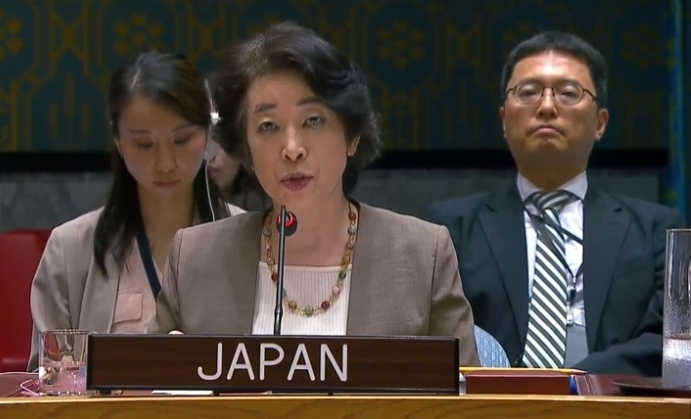平和の促進・持続における寛容の価値に関する安保理会合における志野大使ステートメント
令和6年6月14日

(As delivered)
Thank you, Mr. President.
I thank Ms. Nderitu for her briefing.
It has been a year since this Council adopted a resolution on tolerance and international peace and security.
Yet, the current state of the world continues to be unbearable for many. We are witnessing the highest number of conflicts since World War II, with a quarter of world population living in amidst these crises.
Grievances ignite conflicts, which in turn generate more grievance. Often, this arises not only from genuine difference, but from misunderstanding, prejudice, or disrespect.
To break this vicious cycle and achieve lasting peace, the international community must embrace tolerance and respect the dignity of others. In this spirit, my delegation would like to emphasize three points.
First, tolerance is not about simply tolerating the existence of others, but it requires an active acknowledgement of different values, in the forms of the cultures, beliefs, traditions and more. Embracing tolerance is easier said than done. Japan has been convening human rights dialogues with other member states for over 20 years and exchanging views on various human rights issues. It is also critical to bear in mind that the continuous effort of learning from others must not only be done between states or groups, but between individuals.
Second, tolerance can be fostered through promoting individual efforts to learn from others. This is best achieved through inclusive and holistic education. Japan has been actively supporting various educational programmes, including an initiative in Mosul, Iraq, implemented by UNESCO. This initiative focuses on investing in youth through the development of technical and vocational skills, as well as the prevention of violent extremism. This program aims to cultivate essential cognitive and behavioural skills, such as multi-perspectivity, understanding of complexity, moral courage and responsible online behaviour. By equipping young people with these skills, the initiative not only enhances their personal development but also contributes to building a more tolerant and peaceful society.
Third, Japan believes that tolerance is about refusing any form of violence that threatens the dignity of people and paying great attention to the plight of others. In this regard, the international community must pay particular attention to those who face greater risks posed by armed conflict, such as children, women, and religious and ethnic minorities. In particular, as an advocate for Women, Peace and Security, Japan continues to make its utmost efforts to amplify women’s voices by promoting their meaningful participation in various fields.
Mr. President,
Japan will continue to contribute to peace and prosperity in the international community through ensuring human dignity and tolerance.
I thank you.
I thank Ms. Nderitu for her briefing.
It has been a year since this Council adopted a resolution on tolerance and international peace and security.
Yet, the current state of the world continues to be unbearable for many. We are witnessing the highest number of conflicts since World War II, with a quarter of world population living in amidst these crises.
Grievances ignite conflicts, which in turn generate more grievance. Often, this arises not only from genuine difference, but from misunderstanding, prejudice, or disrespect.
To break this vicious cycle and achieve lasting peace, the international community must embrace tolerance and respect the dignity of others. In this spirit, my delegation would like to emphasize three points.
First, tolerance is not about simply tolerating the existence of others, but it requires an active acknowledgement of different values, in the forms of the cultures, beliefs, traditions and more. Embracing tolerance is easier said than done. Japan has been convening human rights dialogues with other member states for over 20 years and exchanging views on various human rights issues. It is also critical to bear in mind that the continuous effort of learning from others must not only be done between states or groups, but between individuals.
Second, tolerance can be fostered through promoting individual efforts to learn from others. This is best achieved through inclusive and holistic education. Japan has been actively supporting various educational programmes, including an initiative in Mosul, Iraq, implemented by UNESCO. This initiative focuses on investing in youth through the development of technical and vocational skills, as well as the prevention of violent extremism. This program aims to cultivate essential cognitive and behavioural skills, such as multi-perspectivity, understanding of complexity, moral courage and responsible online behaviour. By equipping young people with these skills, the initiative not only enhances their personal development but also contributes to building a more tolerant and peaceful society.
Third, Japan believes that tolerance is about refusing any form of violence that threatens the dignity of people and paying great attention to the plight of others. In this regard, the international community must pay particular attention to those who face greater risks posed by armed conflict, such as children, women, and religious and ethnic minorities. In particular, as an advocate for Women, Peace and Security, Japan continues to make its utmost efforts to amplify women’s voices by promoting their meaningful participation in various fields.
Mr. President,
Japan will continue to contribute to peace and prosperity in the international community through ensuring human dignity and tolerance.
I thank you.
